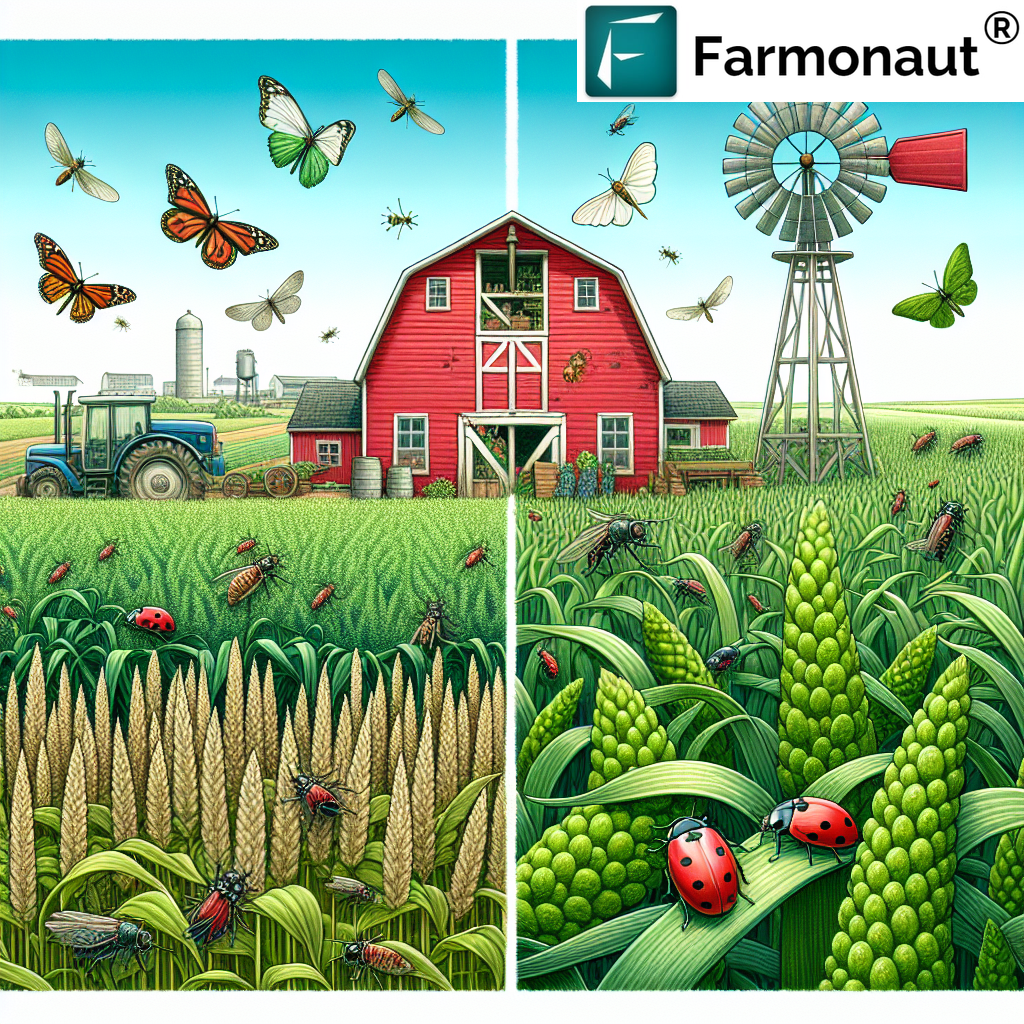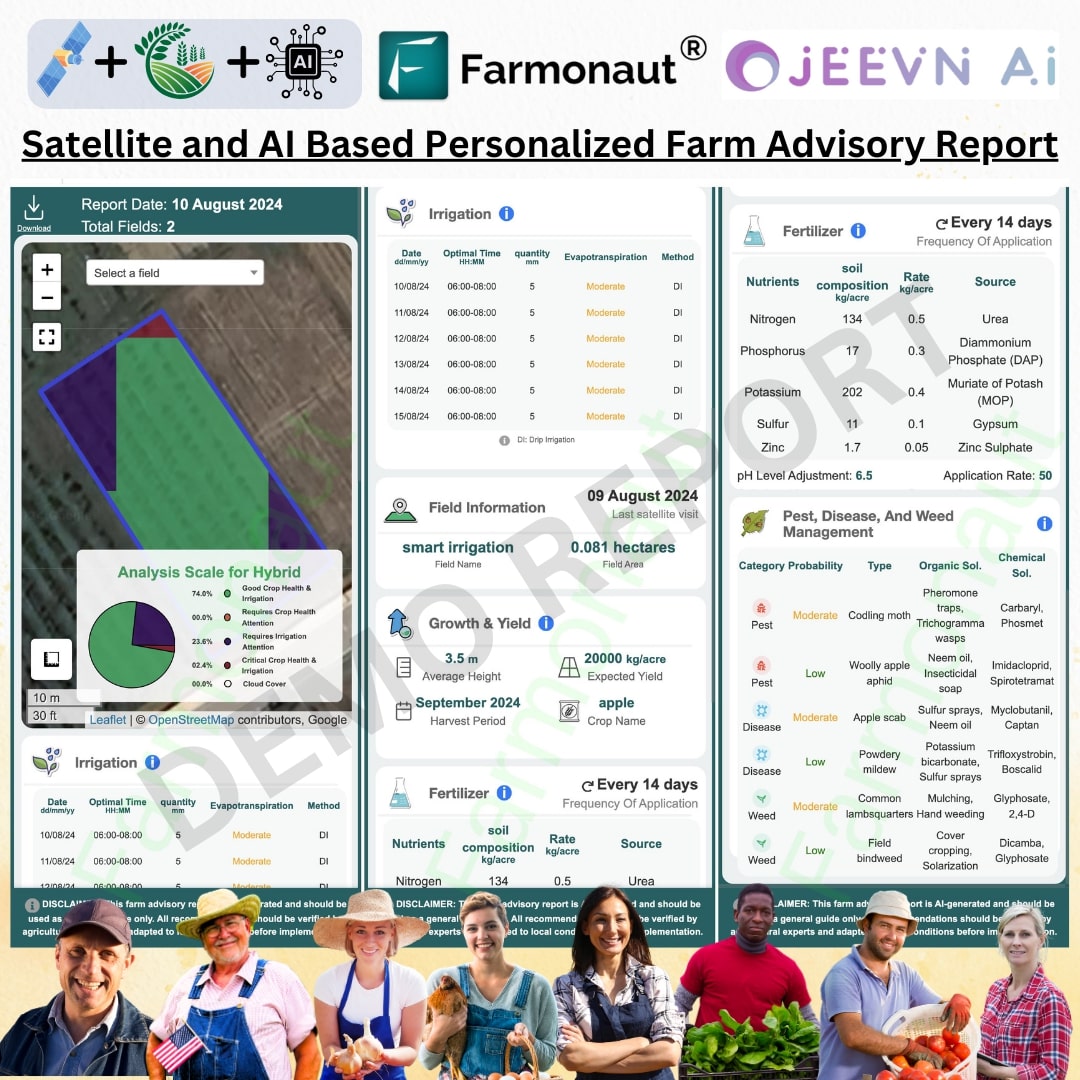Mastering Aphid Farm Management: Grounded Strategies for Sustainable Pest Control

In the ever-evolving world of agriculture, we at Farmonaut are continually striving to provide innovative solutions to the challenges faced by farmers. One such challenge that has been a persistent issue for many growers is the management of aphids in their crops. In this comprehensive guide, we’ll delve into the intricacies of aphid farm management, exploring grounded strategies for sustainable pest control that can help farmers maintain healthy, productive crops.
Table of Contents
- Introduction to Aphid Farms
- Understanding Aphids and Their Impact
- Sustainable Pest Control Strategies
- Implementing a Grounded Aphid Farm Approach
- The Role of Technology in Aphid Management
- Farmonaut’s Contribution to Aphid Control
- Case Studies and Success Stories
- Future Trends in Aphid Farm Management
- FAQs
- Conclusion
1. Introduction to Aphid Farms
When we talk about an aphid farm, we’re not referring to a place where aphids are intentionally cultivated. Rather, it’s a term used to describe agricultural operations that are dealing with significant aphid infestations. These tiny pests can quickly turn a thriving crop into a struggling one, making effective management strategies crucial for farmers worldwide.
At Farmonaut, we understand the challenges posed by aphids and have developed advanced satellite-based solutions to help farmers identify and address pest issues early. Our technology allows for real-time monitoring of crop health, enabling farmers to take swift action against aphid infestations before they become overwhelming.
2. Understanding Aphids and Their Impact
Aphids are small, soft-bodied insects that feed on the sap of plants. They can reproduce rapidly under favorable conditions, leading to large populations that can severely damage crops. Some key points to understand about aphids include:
- Rapid reproduction: Aphids can produce multiple generations in a single growing season.
- Diverse species: There are over 4,000 species of aphids, many of which specialize in specific host plants.
- Direct and indirect damage: Aphids not only weaken plants by feeding on them but can also transmit plant viruses.
- Honeydew production: Aphids excrete a sticky substance called honeydew, which can lead to the growth of sooty mold on plants.
The impact of aphids on farms can be devastating. They can cause:
- Reduced crop yields
- Lower quality produce
- Increased susceptibility to plant diseases
- Significant economic losses for farmers
3. Sustainable Pest Control Strategies
At Farmonaut, we advocate for sustainable pest control strategies that minimize environmental impact while effectively managing aphid populations. Here are some key approaches we recommend:
3.1 Biological Control
Biological control involves using natural predators of aphids to keep their populations in check. Some effective biological control agents include:
- Ladybugs
- Lacewings
- Parasitic wasps
- Hoverflies
By encouraging these beneficial insects, farmers can create a natural balance in their fields, reducing the need for chemical interventions.
3.2 Cultural Practices
Implementing certain cultural practices can help prevent and manage aphid infestations:
- Crop rotation
- Intercropping
- Proper plant spacing
- Removal of weeds that may host aphids
- Use of reflective mulches
3.3 Physical Controls
Physical control methods can be effective for smaller-scale operations:
- Pruning infested plant parts
- Using water sprays to dislodge aphids
- Installing insect barriers or nets
3.4 Chemical Controls as a Last Resort
While we at Farmonaut emphasize sustainable methods, we recognize that in some cases, chemical controls may be necessary. When used, they should be:
- Selective: targeting aphids while minimizing harm to beneficial insects
- Timed correctly: applied when aphid populations are at their most vulnerable
- Used judiciously: as part of an integrated pest management strategy
4. Implementing a Grounded Aphid Farm Approach
A grounded aphid farm approach involves implementing strategies that are rooted in scientific understanding and practical application. This approach combines various methods to create a comprehensive aphid management plan. Here’s how to implement this strategy:
4.1 Regular Monitoring
Consistent monitoring is crucial for early detection of aphid infestations. This can be done through:
- Visual inspections
- Use of sticky traps
- Satellite-based crop health monitoring (like our Farmonaut system)
4.2 Establish Action Thresholds
Determine the level of aphid infestation that warrants intervention. This helps prevent unnecessary treatments and preserves beneficial insects.
4.3 Implement Preventive Measures
- Plant resistant varieties when available
- Maintain optimal plant health through proper nutrition and irrigation
- Create habitat for natural predators
4.4 Use Integrated Pest Management (IPM)
Combine multiple control strategies in a holistic approach:
- Biological control
- Cultural practices
- Physical controls
- Chemical controls (when necessary)
4.5 Continuous Evaluation and Adjustment
Regularly assess the effectiveness of your aphid management strategies and adjust as needed based on results and changing conditions.
5. The Role of Technology in Aphid Management

At Farmonaut, we’re at the forefront of integrating technology into agricultural pest management. Our satellite-based solutions offer several advantages in the fight against aphids:
5.1 Early Detection
Our satellite imagery can detect changes in crop health before they’re visible to the naked eye, allowing for early intervention in aphid infestations.
5.2 Precision Application
By identifying specific areas of infestation, our technology enables targeted application of control measures, reducing overall pesticide use.
5.3 Data-Driven Decision Making
Our AI-powered advisory system, Jeevn AI, analyzes satellite data and other inputs to provide customized aphid management recommendations.
5.4 Monitoring Effectiveness
Continuous monitoring allows farmers to assess the effectiveness of their aphid control strategies and make adjustments as needed.
6. Farmonaut’s Contribution to Aphid Control
At Farmonaut, we’re committed to providing farmers with the tools they need to effectively manage aphid infestations while promoting sustainable agriculture. Our contributions include:
6.1 Satellite-Based Crop Health Monitoring
Our advanced satellite imagery allows for early detection of stress in crops, which can be indicative of aphid infestations. This technology enables farmers to:
- Identify problem areas quickly
- Monitor large areas efficiently
- Track the effectiveness of control measures over time
To learn more about our satellite-based monitoring system, visit our app.
6.2 AI-Powered Advisory System
Our Jeevn AI system provides personalized recommendations for aphid management based on satellite data, weather forecasts, and expert knowledge. This helps farmers:
- Make informed decisions about when to intervene
- Choose the most appropriate control measures
- Optimize the timing of applications
6.3 Integration with Other Farm Management Tools
Farmonaut’s aphid management solutions can be integrated with our other farm management tools, including:
- Weather forecasting
- Soil moisture monitoring
- Crop yield prediction
This holistic approach allows for more effective overall farm management.
6.4 Data Accessibility
We believe in making our technology accessible to all farmers. That’s why we offer:
- A user-friendly mobile app available on both Android and iOS
- API access for developers and businesses to integrate our data into their own systems. Learn more about our API here.
7. Case Studies and Success Stories
While we don’t include specific case studies in this blog, we have numerous success stories of farmers who have effectively managed aphid infestations using Farmonaut’s technology. These farmers have reported:
- Reduced pesticide use
- Improved crop yields
- Better overall farm profitability
8. Future Trends in Aphid Farm Management
As we look to the future, we at Farmonaut are excited about several emerging trends in aphid management:
8.1 Precision Biological Control
Advancements in drone technology and robotics may allow for precise release of beneficial insects in areas of aphid infestation.
8.2 Gene Editing for Pest Resistance
CRISPR and other gene-editing technologies may lead to the development of crops with enhanced natural resistance to aphids.
8.3 AI-Driven Predictive Models
Improving AI algorithms will enable more accurate prediction of aphid outbreaks, allowing for proactive management strategies.
8.4 Nanotechnology in Pest Control
Nanoparticles may be used to deliver targeted, environmentally-friendly pesticides directly to aphids.
9. FAQs
Q1: What are the signs of an aphid infestation?
A1: Signs include curling or yellowing leaves, sticky residue on leaves (honeydew), presence of ants, and visible clusters of small insects on stems or undersides of leaves.
Q2: How can Farmonaut’s technology help in aphid management?
A2: Our satellite-based monitoring system can detect early signs of crop stress, which may indicate aphid infestations. Our AI advisory system then provides tailored recommendations for management.
Q3: Are there any natural predators of aphids?
A3: Yes, ladybugs, lacewings, hoverflies, and parasitic wasps are all natural predators of aphids.
Q4: How often should I monitor my crops for aphids?
A4: Regular monitoring is key. With Farmonaut’s system, you can receive daily updates on crop health, allowing for continuous monitoring.
Q5: Can aphids develop resistance to pesticides?
A5: Yes, aphids can develop resistance to pesticides over time, which is why we recommend an integrated pest management approach that doesn’t rely solely on chemical controls.
10. Conclusion
Managing aphids on farms is a complex but crucial task for maintaining healthy, productive crops. At Farmonaut, we’re committed to providing farmers with the tools and knowledge they need to implement effective, sustainable aphid management strategies. By combining traditional methods with cutting-edge technology, we believe that farmers can successfully control aphid populations while minimizing environmental impact and maximizing crop yields.
We invite you to explore our satellite-based farm management solutions and see how they can revolutionize your approach to pest control. Visit our website or download our app to get started on your journey to more effective aphid management.
Subscribe to Farmonaut
For more information on our API and how developers can integrate our data into their own systems, please visit our API documentation.
Farmonaut Satellite System vs. Drone and IoT-based Farm Monitoring
| Feature | Farmonaut Satellite System | Drone-based Monitoring | IoT-based Monitoring |
|---|---|---|---|
| Coverage Area | Large scale (thousands of hectares) | Medium scale (hundreds of hectares) | Small to medium scale |
| Frequency of Data Collection | Daily | As needed (manual flights required) | Continuous |
| Initial Setup Cost | Low | High (drone purchase required) | Medium to high (sensors needed) |
| Operational Complexity | Low (automated) | High (requires trained operator) | Medium (maintenance required) |
| Weather Dependency | Low (can penetrate cloud cover) | High (clear weather needed for flights) | Low |
| Data Analysis | Advanced AI-powered analysis | Varies based on software used | Real-time data but limited analysis |
| Regulatory Compliance | No issues | May require permits for flights | Generally no issues |
| Scalability | Highly scalable | Limited by flight time and regulations | Requires additional sensor deployment |
As this table demonstrates, while each system has its strengths, Farmonaut’s satellite-based monitoring offers unparalleled coverage, frequency, and ease of use, making it an ideal choice for large-scale, efficient farm management.

